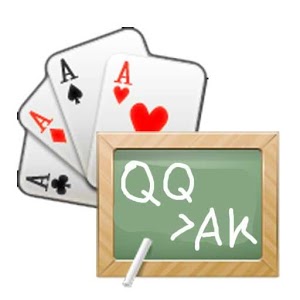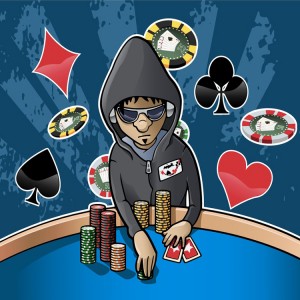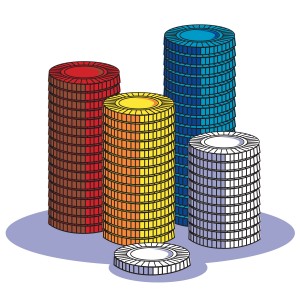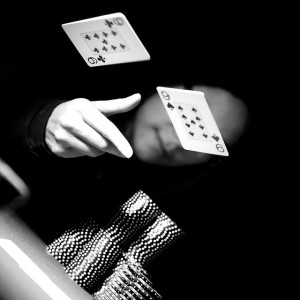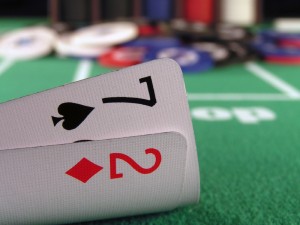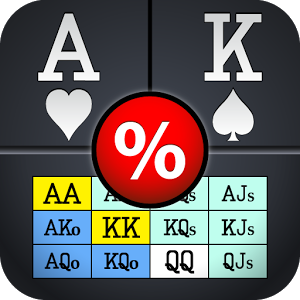Before talking about the merits of single tabling, I should give you a brief history of my playing career. I started playing internet poker three years ago after watching it on TV. Like the majority of people I started off clueless, played above my bankroll and lost a lot. After about 6 months of constant studying and improvement I started to play reasonably and found myself holding my own in the 10/20 full table game I was playing at pokerroom.com.
Back in those days, you could only play one table at a time. Furthermore, game selection was never a factor because you were lucky if there was more than one full table at the given limit you wanted to play. As a result, I would usually have to wait for a short period for a seat to become free (unthinkable given the playing traffic these days).
Every day I would be surrounded by the same players. All these players ranged from slight losers to winners and so the standard was a lot higher than you would find now online.
Bear in mind, we are talking about pre Pokertracker days here. I would make hand written notes as well as mental notes on my opponents and reassess them day after day for months on end, slowly refining my notes so that eventually it was almost as if I could play their hand as if I were them. It got to the point where I knew that a particular player would raise 77 UTG but only limp with 66. There were about 5 to 10 players who I began to know inside out.
After about 6 months, interest in poker started to explode. The software improved and I found myself moving to Party where I had a chance to increase my earn rate through the use of game selection. However, the apprenticeship I served at Pokerroom held me in good stead when compared to a lot of my competitors who were new to the game. When I sat down I could pick up within a few hands what type of players my opponents were and I was able to make reasonably accurate judgments on how they would play certain types of hand in certain types of situation.
Human nature dictates that new players are trying to make as much money as quickly as possible and they can now start multitabling from day one. They mistakenly think that by playing more tables they will gain more experience and therefore improve at a faster rate. The problem with this generation is that many of them lack the observational and categorisation skills that would improve their earn rate. They also tend to lack something which I call “feel”. “Feel” is about being able to correctly assess the relative strength of your holding given your opponents, the action and the board. You can not get “feel” from looking at Pokertracker stats, rather you have to carefully watch the table and establish an understanding of the table’s dynamics and your opponents’ characteristics.
The truth is that the vast majority of multitablers make decisions without giving consideration to the opponents who have acted or the opponents who are left to act. “I have TT so I three bet the EP raiser” or “I have KJ so I fold on the button to the MP open raise”. These decisions may be correct decisions but it is the type of player the EP and MP are which makes the decisions correct, not the fact that you have TT or KJ.
Are you somebody who multitables? If so, ask yourself these questions:
When was the last time you folded AQ, TT or even JJ preflop?
When was the last time you folded an overpair on the flop?
When was the last time you folded a flush draw on the flop?
Now usually when I ask the above questions, somebody responds with something like “if you never folded AA before a showdown you would never be making that big a mistake”. Are you really happy to play in a manner where you make “small” mistakes? Surely, the objective is to try and play optimally. Going back to my days at Pokerroom there was one particular player who would only raise in EP with JJ-AA. With AK or AQ he would limp. If I was next to act with TT wouldn’t I be making a mistake by doing anything other than folding?
There is no doubt that in games with weak opponents you can make a steady return even without observation or categorisation skills. However, at a recent live tournament it really struck me how you will eventually get found out if you do not possess them. At this tournament I had a young lad next to me and we got to talking about playing online. He was studying at University and made a decent income playing 3 or 4 tables of 3/6 at Party. I could see why he was making money at the limit he was playing. He only played good starting hands, bet his good hands, folded his weak hands and so on. However, he had no interest in what was going on in a pot when he wasn’t involved in a hand. He would stand up and chat to his friend who was sitting behind us or he would look around the room to see what was going on. Numerous showdowns took place without him showing any interest in what cards were being shown. Needless to say, he was putting himself at a huge disadvantage when compared to those players who were taking an interest in such important matters. The sad fact was that he didn’t know that he should be observing and even if someone had advised him to watch the action he wouldn’t have known what to look for.
Due to the growth in popularity in the online game, it is unlikely that you will have the opportunity I had to play against and observe the same group of people for months on end. At the big sites like Party you will occasionally come across the same faces but not for the extended period I did. However, you should not let this deter you from trying to work on your observational and categorisation skills. The next time you play why not sit down at one table, turn off all distractions, and make notes. Watch who is raising with what and from where. Who is playing the most hands and who is never involved? Is anyone at your table playing dynamically and adjusting his play to the situation like you should be doing? Can you spot the players at your table who are multitabling (this is a good test)? Take note of the hands shown on the river and replay the hand in your head. Take as much interest in the hands you are not involved in as the hands you play.
I know a lot of people say that they get bored when they play just one table. How can improving yourself as a player and increasing your future earnings be “boring”? I know that I find poker much more interesting when I am making the decision to fold 99 preflop in the one hand and reraising with A3o preflop on the next hand. You must learn to take satisfaction from correctly evaluating situations, whether you are involved in them or not. This is the true test of how well you are playing. You need to realise that short term increases or decreases in your bankroll are no reflection of your ability as a player.
To conclude, I am not suggesting that you should never multitable. It would be hypocritical for me to suggest that given that I multitable two tables of 30/60. I am suggesting that you spend some time developing skills that will improve your earn rate when you go back to multitabling. Hopefully, you will be surprised how quickly you are able to categorise players once you start watching patterns and behaviours. With this extra skill at your disposal, you will be able to increase your earn rate per table and speed up your progression to the higher limits.
In next months article, I am going to look at how playing shorthanded can improve you as a player. Until then, why not take up my suggestion of playing for a couple of hours at one table without perusing the internet or watching TV and see how many things have been passing you by. You never know, you might start to get a real “feel” for the game you have been playing.
Submit your review | |

